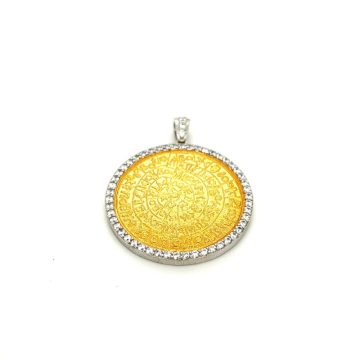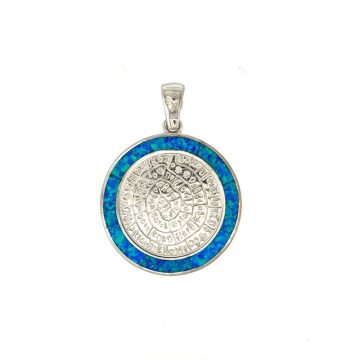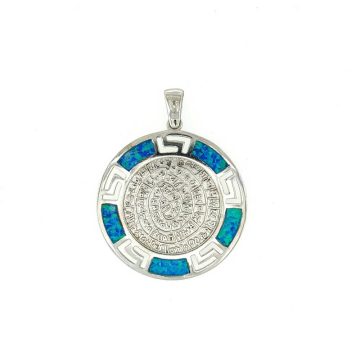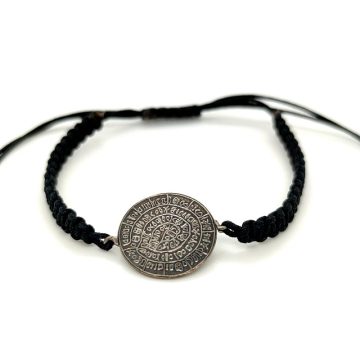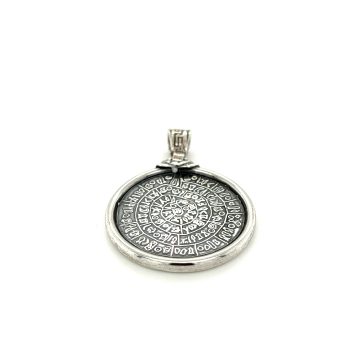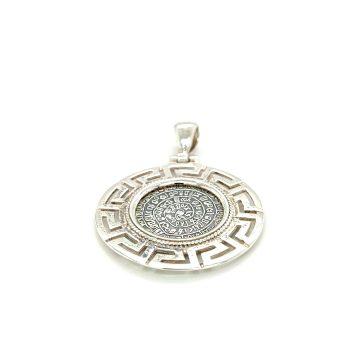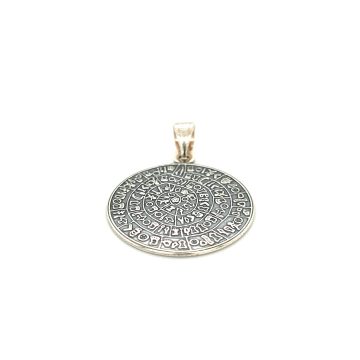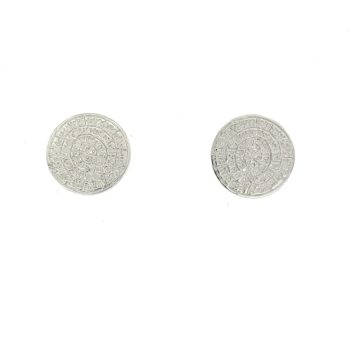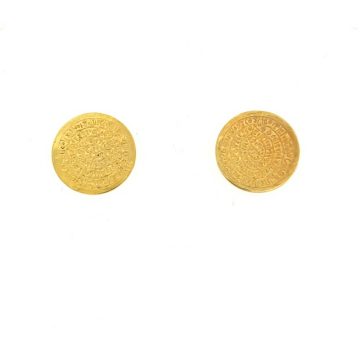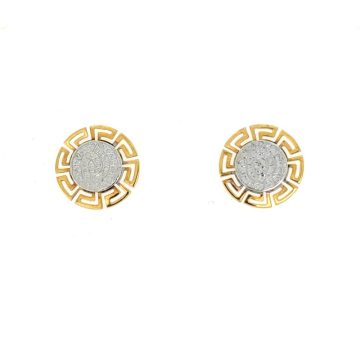Bracelet, silver (925°), Disc of Phaistos with artificial opal
Women’s bracelet made of silver (925 °) with the Disc of Phaistos and artificial opal. The Disc of Phaistos is a disc of baked clay, which is an archaeological find from the Minoan city of Phaistos in southern Crete and probably dates to the middle or late Minoan Bronze Age. It is one of the …
Pendant, silver (925°), Disc of Phaistos with zirgon
Women’s pendant made of silver (925°) plated with zircon with the Disk of Phaistos. The Disk of Phaistos is a disk of baked clay, which is an archaeological find from the Minoan city of Phaistos in southern Crete and probably dates to the middle or late Minoan Bronze Age. It is one of the most …
Pendant, silver (925°), Disc of Phaistos with artificial opal
Women’s pendant made of silver (925 °) with Disc of Phaistos and artificial opal. The Disc of Phaistos is a disk of baked clay, which is an archaeological find from the Minoan city of Phaistos in southern Crete and probably dates to the middle or late Minoan Bronze Age . It is one of the …
Pendant, silver (925°), Disc of Phaistos with a wreath of meander and artificial opal
Women’s pendant made of silver (925 °) with the Disk of Phaistos and a meander wreath with artificial opal.The Disk of Phaistos is a disk of baked clay, which is an archaeological find from the Minoan city of Phaistos in southern Crete and probably dates to the middle or late Minoan Bronze Age. It is …
Women’s bracelet silver (925°) macrame, Disc of Phaistos
Women’s macrame bracelet made of silver (925 °) with the Disk of Phaistos. The Disk of Phaistos is a disk of baked clay, which is an archaeological find from the Minoan city of Phaistos in southern Crete and probably dates to the middle or late Minoan Bronze Age. It is one of the most famous …
Women’s bracelet macrame , gold K14 (585°), Disc of Phaistos
Women’s macrame bracelet made of gold K14 (585 °) with the Disc of Phaistos.The Disk of Phaistos is a disk of baked clay, which is an archaeological find from the Minoan city of Phaistos in southern Crete and probably dates to the middle or late Minoan Bronze Age. It is one of the most famous …
Pendant, silver (925 °), Phaistos disk with frame
Pendant made of silver (925 °) with Disc of Phaistos and frame. The Disc of Phaistos is a disk of baked clay, which is an archaeological find from the Minoan city of Phaistos in southern Crete and probably dates to the middle or late Minoan Bronze Age . It is one of the most famous …
Pendant, silver (925 °), Disc of Phaistos with meander
Women’s pendant made of silver (925 °) with the Disk of Phaistos and a meander wreath. The Disk of Phaistos is a disk of baked clay, which is an archaeological find from the Minoan city of Phaistos in southern Crete and probably dates to the middle or late Minoan Bronze Age. It is one of …
Pendant Disc of Phaistos, silver (925°)
Α pendant made of silver (925°) with Disc of Phaistos. The Disc of Phaistos is a disk of baked clay, which is an archaeological find from the Minoan city of Phaistos in southern Crete and probably dates to the middle or late Minoan Bronze Age . It is one of the most famous mysteries of …
Women’s earrings, white gold K14 (585°), Phaistos Disc
Women’s earrings made of K14 white gold (585°) with the Disc of Phaistos. The Phaistos Disc is a baked clay disc, which is an archaeological find from the Minoan city of Phaistos in southern Crete and probably dates to the middle or late Minoan Bronze Age. It is one of the best-known mysteries of archaeology, …
Women’s earrings, gold K14 (585°), Phaistos Disc
Women’s earrings made of K14 gold (585°) with the Disc of Phaistos. The Phaistos Disc is a baked clay disc, which is an archaeological find from the Minoan city of Phaistos in southern Crete and probably dates to the middle or late Minoan Bronze Age. It is one of the best-known mysteries of archaeology, since …
Women’s earrings, gold K14 (585°), Phaistos Disc with meander two-tone
Women’s earrings with the Disc of Phaistos and a meander ring made of K14 gold (585°). The Phaistos Disc is a baked clay disc, which is an archaeological find from the Minoan city of Phaistos in southern Crete and probably dates to the middle or late Minoan Bronze Age. It is one of the best-known …


